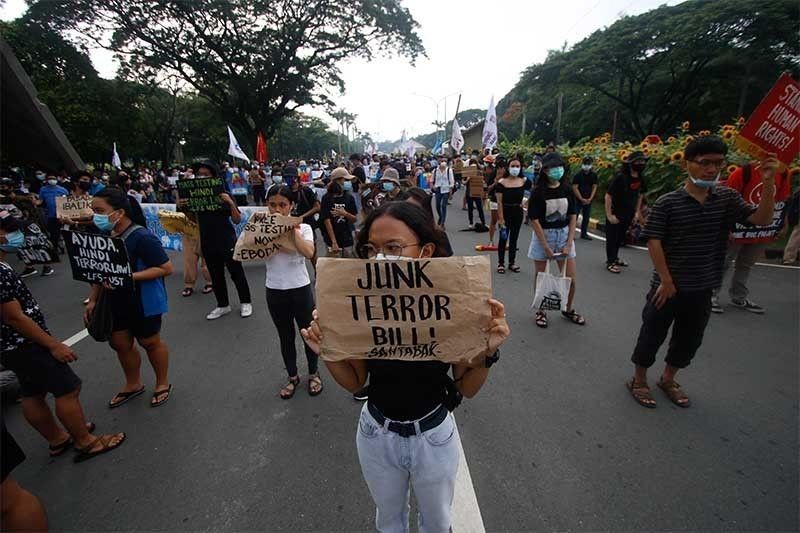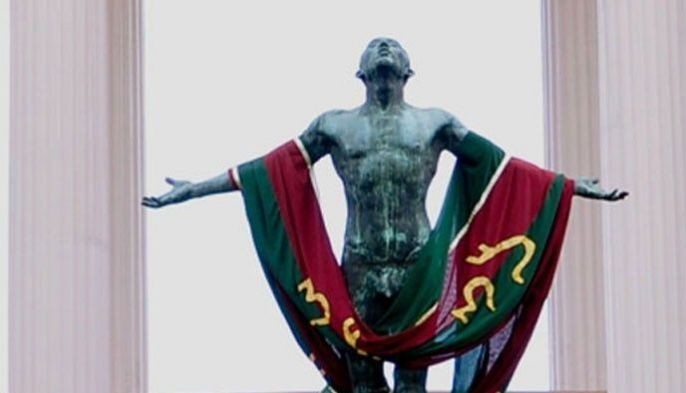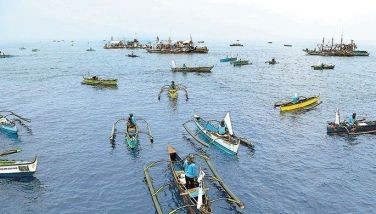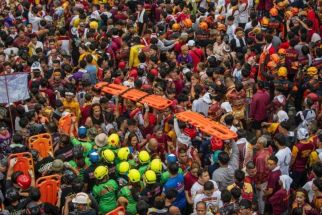CBCP: Catholic Church cannot keep silent when wrongs are committed

MANILA, Philippines — The Catholic Church will cease to exist if it stays silent on serious matters affecting people’s fundamental rights, the Catholic Bishops’ Conference of the Philippines said Monday.
The CBCP issued a strongly-worded pastoral letter Sunday, denouncing the passage of the contentious Anti-Terrorism Act of 2020, which is feared to be used as a weapon to suppress legitimate dissent and opposition.
“The dissenting voices were strong but they remained unheeded. None of the serious concerns that they expressed about this legislative measure seemed to be of any consequence to them. Alas, the political pressure from above seemed to weigh more heavily on our legislators than the voices from below,” read the letter signed by Caloocan bishop Pablo Virgilio David, CBCP acting president.
The pastoral letter also expressed concern over the shutdown of media giant ABS-CBN.
“We cannot just be quite about all these things. Otherwise, we also risk losing our voice at the same time, we also risk not doing our moral obligation to our country,” Fr. Jerome Secillano, CBCP spokesperson, said in an interview on ABS-CBN News Channel.
“If the Church does not anymore speak about all these matters when in fact there are wrongs being committed left and right, then we cease to exist as a Church,” he added.
Secillano also said the Constitution does not bar church leaders from expressing their opinions, contrary to the claim of Chief Presidential Legal Counsel Salvador Panelo that the CBCP violated the Constitutional provision on the separation of the Church and State.
“From my legal understanding of the constitutional provision of separation of Church and State, it means that the State is not actually going to put up an official religion. Secondly, that state funds should be used to fund a particular religion… But it doesn’t actually bar Church leaders, priests, bishops or any religious for that matter to express their political opinions,” he said.
The CBCP spokesperson stressed it is the prophetic role of the Catholic Church to speak out on matters that are affecting the people’s fundamental rights and the moral order.
“So we are entering into a picture not to interfere with the affairs of the government but actually to make people aware of what’s happening, to correct all these errors, all these wrongs being done against the people,” Secillano said. — Gaea Katreena Cabico
President Rodrigo Duterte signed the Anti-Terrorism Law on July 3 despite opposition from rights groups and civil society groups that it could be used to stifle human rights.
A petition against the law has been filed at the Supreme Court and other groups are preparing pleadings of their own.
Follow this page for updates. Photo courtesy of The STAR/Michael Varcas
National Security Adviser Hermogenes Esperon moves to block access to several websites, including news sites of alternative news orrganizations Bulatlat.com and Pinoyweekly.org.
In his letter to the National Telecommunications Commission, he only says the websites are "affiliated to and are supporting these terrorists and terrorist organizations."
No other basis to back up his allegation was cited in the letter.
Citing the designation of the CPP-NPA-NDF as terrorists, NSA Hermogenes Esperon moves to block access to several sites.
— Kristine Patag (@kristinepatag) June 22, 2022
In Esperon's letter to the NTC, he included news sites @bulatlat and @pinoyweekly; sites of other progressive groups RMP and Save our Schools. @PhilstarNews pic.twitter.com/nAzMITJFsS
The Commission on Human Rights says it "partly welcomes" the Supreme Court decision that some parts of the controversial Anti-terrorism Law are unconstitutional.
CHR spokesperson Jacqueline de Guia says the commission remains hopeful that the remaining contentious provisions of the law will be clarified by the high cour in the full text of the decision.
"At the same time, our commitment remains in guarding against possible human rights violations arising from the implementation of the anti-terror law. We steadfastly remind the government that countering terrorism and protecting human rights are not competing values but are, in fact, mutual and complementary," De Guia says in a statement.
The Supreme Court has deliberated and voted on the controversial Anti-Terrorism Act but the decision will be released "at the soonest time possible."
"However, considering that there were numerous issues resolved in the case, as well as the fact that each Justice had to vote on each issue, there is a need to accurately confirm and tally the vote of each Justice in order to ensure the correct resolution of the Court per issue," SC spokesperson Brian Hosaka says.
The Anti-Terrorism Council designates the National Democratic Front of the Philippines, the panel that negotiates for communist rebels during peace talks a terrorist organization.
Previous designation of the Communist Party of the Philippines and New People's Army led to the designation of supposed members of the CPP's Central Committee. Among those designated as terorrists were peace consultants.
Designation gives the Anti-Terrorism Council the authority to investigate and freeze the accounts of designated persons.
The Anti-Terrorism Council has designated 29 people, including alleged members of the Communist Party of the Philippines-New People's Army, as terrorists in two resolutions.
Designation allows the Anti-Money Laundering Council to freeze the assets of those on the list.
- Latest
- Trending
































